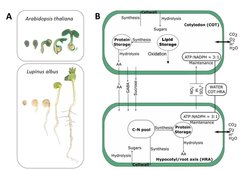Role of sulfur metabolites in shaping bacterial communities
Supervision: The project will be supervised by Stanislav Kopriva at the University of Cologne.
Abstract: There is clear evidence that plants shape microbiome structures, most probably by root exudates, and also that bacteria have developed various adaptations to thrive in the rhizospheric niche. We have contributed to this knowledge by identification of camalexin as one of the metabolites affecting the interaction of Arabidopsis plants with individual bacterial strains as well as the microbiome function. We have identified a gene affecting camalexin synthesis and exudation and the outcome of cocultivations with bacteria. We also showed that these outcomes are dependent on sulfur availability. In this project we will determine how camalexin affects microbial function and how shoots and roots communicate to control its synthesis and exudation. Using mutants in plant sulfate assimilation we will establish whether and how sulfur nutrition contributes to control of microbiome assembly.
Key publication: Koprivova, A., Schuck, S., Jacoby, R. P., Klinkhammer, I., Welter, B., Leson, L., ... & Kopriva, S. (2019). Root-specific camalexin biosynthesis controls the plant growth-promoting effects of multiple bacterial strains. Proceedings of the National Academy of Sciences, 116(31), 15735-15744.
Link to the Kopriva group homepage: https://ag-kopriva.botanik.uni-koeln.de/

